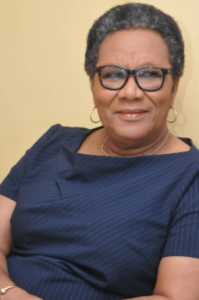Breaking bias in Africa: An Interview with Dr. Helena Asamoah-Hassan
03 March 2022
Dr. Helena Asamoah-Hassan is Executive Director of the African Library and Information Associations and Institutions (AfLIA) and speaker at the Panel Discussion, organised by the IFLA Sub-Saharan Africa Regional Division Committee in the context of the UN Africa Regional Forum for Sustainable Development
Where and how do you think libraries can help to break bias around the world?
We should be relevant globally right from the community level, providing easy access to current, accurate, educative and relevant information for development of the society.
What are the greatest challenges that you foresee in the pursuit of change?
Resistance to change (of mindset), limited funding and inadequate professional training.
How have you encountered and/or challenged bias change in your own career?
When a superior officer decided to block all ideas/efforts of bringing change by using technology in the way we offer service to our users and hiding under the pretext of inadequate funding. I got him to be trained one-on-one, instead of being in a group training, on how to use computers and databases to access information.
What sort of world do you wish to see for the next generation of library and information professionals?
Using technology more for service provision. Taking vital information from the library to the desktop of users through technology, without the user having to come to the library building.
What are the greatest challenges we face in pursuit of these goals? How can IFLA members get involved?
Librarians experiencing lack of access and involvement in activities towards the achievement of the SDGs. Carry out advocacy and marketing, letting people know, through examples, what we have done and what we can do towards the achievement of the SDGs. These will open the doors to us.
Do you have a favourite library or place to read?
I used to read mostly in my study which had a library until its destruction by fire recently. Now re-building and I will read there again when completed.
How can libraries support the government in realising Agendas 2030 and 2063?
Get involved in planning and carry out activities that support the realisation of the goals of Agendas 2030 and 2063
What does this mean in terms of partnerships between libraries and other stakeholders (Civil society, NGOs)?
Find out relevant stakeholders and come to agreement as to how you can work together and then implement the decisions made.
What steps would you prioritise in order to maximise the contribution of libraries to the achievement of the SDGs and AU Agenda 2063?
The SDGS and AU Agenda are realised by a country through cumulative activities made from the local to the national level. Libraries should make contact with the national development plan office to plan activities. Libraries should ensure that the plans agreed upon are implemented and monitored appropriately.
Is there a new way of getting all libraries on board to share their success stories (marketing/advocacy) as some libraries are loud (seen) and many very silent?
Establish a clearly laid out structure or timetable, if possible, that will enable each library to share its success stories at a certain time
What strategy can we deploy in collaborating with government officials who are mainly politicians who come and go when their term of office expires in bridging the librarianship gap we are discussing?
Ensure that most activities planned are short term and so can be completed within the politician’s term of office. With long term projects, involve the opinion leaders in the community and ensure that the promises are documented to commit in coming politicians. One can also involve the civil servants when you copy the head of the administration in communication, and not only deal with the politician and his office.
Could you give more specific examples of partnerships involving library funding for specific programmes on Climate Change?
A liquefied petroleum Gas producing company and the Environmental Protection Agency funding the public libraries to carry out workshops, seminars, durbars supported by the distribution of leaflets to educate and inform users, on the effect of cutting down trees and burning them to produce charcoal for cooking, has on the climate, and also the effect of felling trees near rivers on the climate.
We have established the fact that information is a powerful tool for national development. How can libraries sell this truth to our politicians who run the affairs of our countries?
The library needs to search for relevant information capable of solving key thorny issues in development and present them to the politician to support decision making.
Carry out research on what is needed for development. Then plan and involve the politician in seminars that will inform how these needs may be met. Some activities of the library go with little or no cost so one can use that to engender the interest of the politician (as most often they do not want to spend money) in the library. There will be more success if the needs identified coincide with what the politician has indicated in his manifesto to the constituents.
How can we bridge the gap between libraries in developing countries and those in developed countries as far as information provision is concerned to the patrons?
Access to information is universal and so developing & developed countries can have access to the same information, especially by using technology these days. However most often there are limited resources which prevent access to the same information by developing countries. The issue of limited resources needs to be addressed in order to bridge the gap.
Is there anything else you would like to share?
Librarians should embrace change, offer cutting edge services as they evolve by the day. There are several other people getting into our space now, who are not as qualified as we are, but are tech savvy and wield influence. We need to step up our technological knowledge and advocacy skills to remain relevant.
